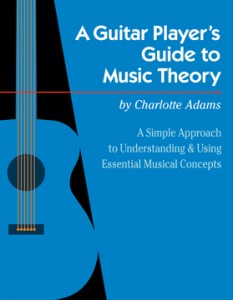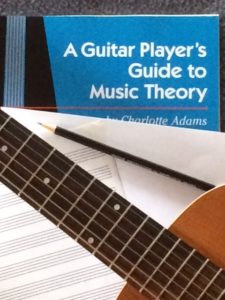Guitar is such a great instrument, because it can hook you in from the first time you pick it up. From the moment you hold it and strum the open strings or play something as simple as an Em chord, it’s giving something back to you. In a matter of hours, it’s possible to learn enough chords to actually play a song. Within a few months you might have several songs under your fingers.
The other side of that almost-instant return is that the guitar is also a very complex instrument which can keep us not only mystified and intrigued, but also inspired and motivated for a lifetime. After mastering those first few songs, most people long to know even more chords, or to move up the neck, play some leads or riffs, or even create their own chords and melodies.
Then What?
It is at this point that many guitar players begin to entertain thoughts of studying music theory. Those thoughts, however, are often quickly tempered by resistance. It’s no wonder, considering how foreign the language can seem and how many unknowns there are: Is it relevant to the music you play? How long will it take to acquire the information you need? Will you be buried in a book for months – or worse yet, years – in order to find answers to your questions? Once you get those answers, will you be a better player? In short, is there a good return on investment in music theory for guitar players?
One way to increase your knowledge without launching into intensive study is to search for answers that directly apply to what you want to play. This is a natural approach and it can be rewarding, but it’s usually limited. You may become confused about language or symbols or discover a gap in your understanding of musical structure. For example, most of the students who come to me for lessons are familiar with a lot of terms, but they don’t fully understand their meaning or know how to make use of the concepts those terms describe. Consequently, they often play wrong chords, use inappropriate scales when soloing, or avoid playing a lot of the music that they love.
Most of these muddy areas result from a lack of familiarity with the most basic aspects of the musical language. Many of those aspects are not addressed in the average theory book – perhaps because they are so basic. It’s as if the teacher or author, being fluent in the language, forgets that the newcomer needs to know the alphabet before beginning to read, write, or speak the language. Unfortunately, the student doesn’t have a clue what questions to ask in order to bridge the gap.
The Solution
In order to clarify concepts and make them actually work for you in your playing, you need instruction that clearly and accurately communicates them and does so in a logical, easy to understand, step-by-step manner. A Guitar Player’s Guide to Music Theory does just that!
(Look inside this book
To purchase, click here)
 Every chapter starts with a page that describes why you need to know (the topic) and how to make it easy. After that you will find the instruction, followed by worksheets and answer sheets that help you to ingrain the information. And, to make it even easier, I have provided options that allow you to choose the way you learn. You may prefer to go it alone with the book (very doable!). If, however, you prefer working with me, choose from various levels of guidance and assistance through videos and email.
Every chapter starts with a page that describes why you need to know (the topic) and how to make it easy. After that you will find the instruction, followed by worksheets and answer sheets that help you to ingrain the information. And, to make it even easier, I have provided options that allow you to choose the way you learn. You may prefer to go it alone with the book (very doable!). If, however, you prefer working with me, choose from various levels of guidance and assistance through videos and email.
The only thing you have to do to learn the theory that you need is to work with the information in a relaxed, unhurried manner. Study the explanations, do the worksheets and then apply each bit of knowledge as you play your guitar. In other words, have fun and reap the rewards!
_____________________________________________________________________________
_______________________________________________________________________________________________
A Guitar Player’s Guide to Music Theory is an 88-page spiral bound book designed for guitarists who want to expand their abilities and learn to communicate better with other musicians. It is for people who want to be able to comprehend, absorb, and effectively use the wealth of information available in instructional books and on the Internet. It is also for guitarists who lead normal lives and don’t have the time, money, or possibly even the desire to invest in a four-year degree at a music school. It is simply the music theory for guitar players that is accessible and relevant. There are no tests, no deadlines or time frames and no chance of failure, considering there is no finish line!
Do you like learning from videos? Would you like my personal help? My personalized online theory course includes nine instructional videos in addition to the book and you can choose the level of personal assistance you receive. It’s easy, affordable and tailored to your needs!

For details or purchase, click here
To inquire about private lessons or workshops with Charlotte, contact us.
_______________________________________________________________________________________________
_______________________________________________________________________________________________